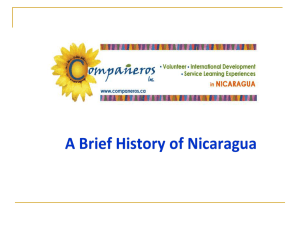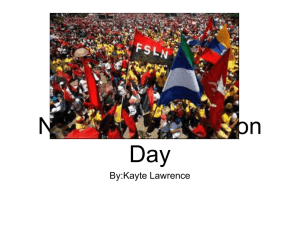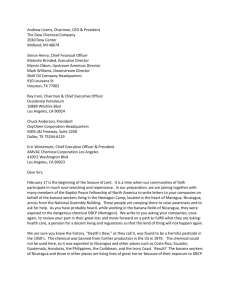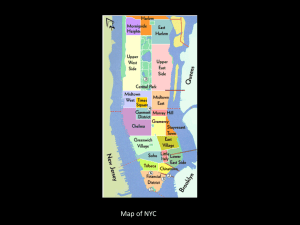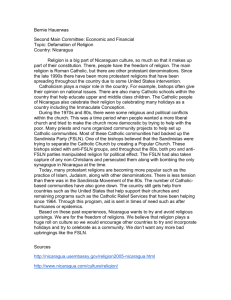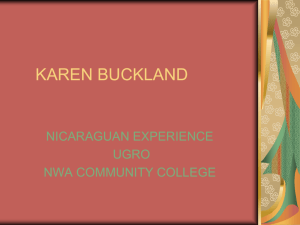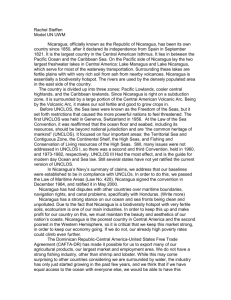NICARAGUA
advertisement
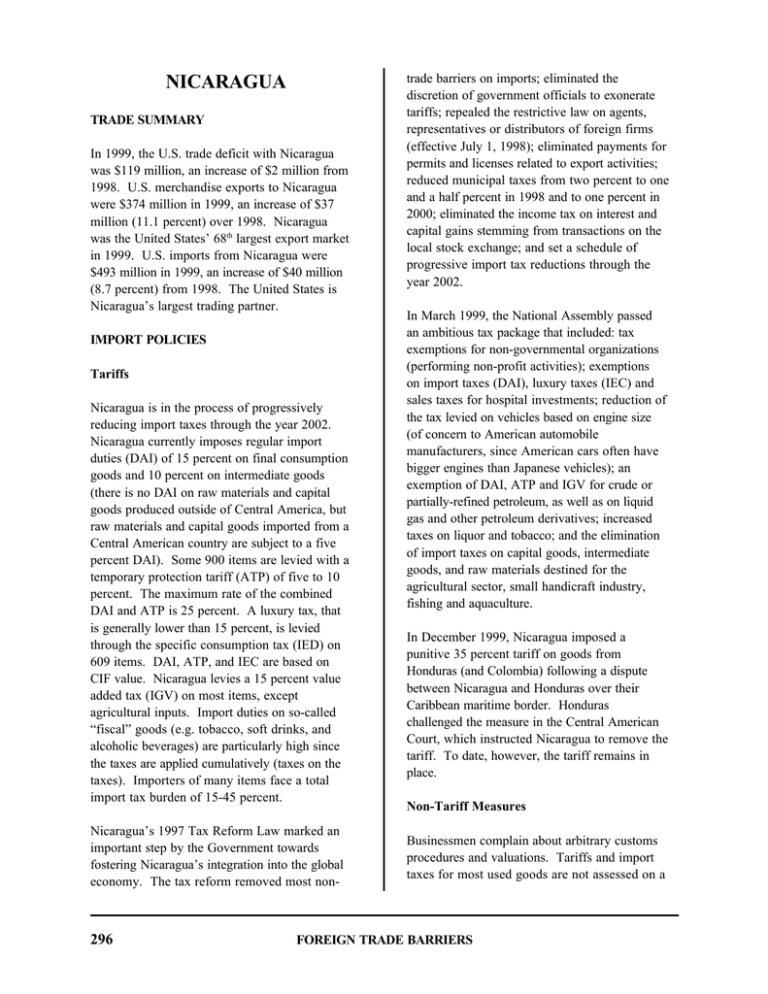
NICARAGUA TRADE SUMMARY In 1999, the U.S. trade deficit with Nicaragua was $119 million, an increase of $2 million from 1998. U.S. merchandise exports to Nicaragua were $374 million in 1999, an increase of $37 million (11.1 percent) over 1998. Nicaragua was the United States’ 68th largest export market in 1999. U.S. imports from Nicaragua were $493 million in 1999, an increase of $40 million (8.7 percent) from 1998. The United States is Nicaragua’s largest trading partner. IMPORT POLICIES Tariffs Nicaragua is in the process of progressively reducing import taxes through the year 2002. Nicaragua currently imposes regular import duties (DAI) of 15 percent on final consumption goods and 10 percent on intermediate goods (there is no DAI on raw materials and capital goods produced outside of Central America, but raw materials and capital goods imported from a Central American country are subject to a five percent DAI). Some 900 items are levied with a temporary protection tariff (ATP) of five to 10 percent. The maximum rate of the combined DAI and ATP is 25 percent. A luxury tax, that is generally lower than 15 percent, is levied through the specific consumption tax (IED) on 609 items. DAI, ATP, and IEC are based on CIF value. Nicaragua levies a 15 percent value added tax (IGV) on most items, except agricultural inputs. Import duties on so-called “fiscal” goods (e.g. tobacco, soft drinks, and alcoholic beverages) are particularly high since the taxes are applied cumulatively (taxes on the taxes). Importers of many items face a total import tax burden of 15-45 percent. Nicaragua’s 1997 Tax Reform Law marked an important step by the Government towards fostering Nicaragua’s integration into the global economy. The tax reform removed most non- 296 trade barriers on imports; eliminated the discretion of government officials to exonerate tariffs; repealed the restrictive law on agents, representatives or distributors of foreign firms (effective July 1, 1998); eliminated payments for permits and licenses related to export activities; reduced municipal taxes from two percent to one and a half percent in 1998 and to one percent in 2000; eliminated the income tax on interest and capital gains stemming from transactions on the local stock exchange; and set a schedule of progressive import tax reductions through the year 2002. In March 1999, the National Assembly passed an ambitious tax package that included: tax exemptions for non-governmental organizations (performing non-profit activities); exemptions on import taxes (DAI), luxury taxes (IEC) and sales taxes for hospital investments; reduction of the tax levied on vehicles based on engine size (of concern to American automobile manufacturers, since American cars often have bigger engines than Japanese vehicles); an exemption of DAI, ATP and IGV for crude or partially-refined petroleum, as well as on liquid gas and other petroleum derivatives; increased taxes on liquor and tobacco; and the elimination of import taxes on capital goods, intermediate goods, and raw materials destined for the agricultural sector, small handicraft industry, fishing and aquaculture. In December 1999, Nicaragua imposed a punitive 35 percent tariff on goods from Honduras (and Colombia) following a dispute between Nicaragua and Honduras over their Caribbean maritime border. Honduras challenged the measure in the Central American Court, which instructed Nicaragua to remove the tariff. To date, however, the tariff remains in place. Non-Tariff Measures Businessmen complain about arbitrary customs procedures and valuations. Tariffs and import taxes for most used goods are not assessed on a FOREIGN TRADE BARRIERS NICARAGUA CIF/bill of lading basis, but rather on an arbitrary reference price determined by Customs at the time of entry (which can be significantly higher than the actual price paid). Presentation of a bill of sale (or other evidence of purchase price) that is certified by a Nicaraguan consular official is often, but not always, accepted by customs inspectors as proof of the value of used goods. For instance, the tax reform law establishes that used vehicle values will be assessed by using the most recent version of the “blue book”, regardless of the mechanical condition of the vehicle. This system must be phased out by September 3, 2000, Nicaragua’s deadline for implementation of the WTO Customs Valuation Agreement, which does not provide for the use of arbitrarily-established prices in determining customs valuation. Nicaragua’s 1997 Tax Reform Law eliminated the price-band mechanism. In November 1999, the Nicaraguan Government issued a decree that raised existing taxes by 15 percent on rice, yellow corn and sorghum, raising taxes to as high as 45 percent, although still within Nicaragua’s WTO bound rates. This decree is renewed every 30 days. The Government has said it will lower these tariffs once world prices for these commodities rebound. GOVERNMENT PROCUREMENT The 1981 Law of Administrative Contracting by the State, Decentralized Autonomous Agencies, and Municipalities sets out clear guidelines for government procurement. However, in practice, many government agencies and state-owned companies engage in direct purchasing outside of the framework of this law. On December 2, 1999, the National Assembly passed a new law on government contracts aimed at improving transparency in government procurement. Nicaragua is not a signatory to the WTO Agreement on Government Procurement. INTELLECTUAL PROPERTY RIGHTS PROTECTION On January 7, 1998, Nicaragua signed a Bilateral Intellectual Property Rights Agreement with the United States – the first such agreement in Central America. The Agreement, which had been under negotiation for four years, covers copyrights, patents, trademarks, semiconductor layout designs, encrypted program-carrying satellite signals, trade secrets, and industrial designs. The Agreement addresses criminal and civil penalties for infractions and appears to provide a level of protection that exceeds commitments in the WTO Agreement on TradeRelated Aspects of Intellectual Property Rights (TRIPS). The Agreement called for full implementation by mid-1999 – a deadline Nicaragua was unable to meet. However, by the end of 1999, the Nicaraguan National Assembly had passed updated laws on copyright protection, protection of plant varieties, and satellite signals. Piracy of sound and video recording, as well as U.S. satellite signal and broadcast theft, remains a problem in Nicaragua. In July 1999, the National Assembly passed copyright legislation that will greatly strengthen copyright protection. Violators will now face fines and jail sentences. A complementary law on television programming carriers was passed in November 1999. Nicaragua became a signatory to the Berne Convention in 1999. Nicaragua is also a signatory to the following copyright conventions: the Mexico Convention on Literary and Artistic Copyright; the Buenos Aires Convention on Literary and Artistic Copyrights; the Inter-American Copyright Convention; the Universal Copyright Convention (the 1952 Geneva Convention and the 1971 Paris Convention); and the Brussels Satellite Convention. FOREIGN TRADE BARRIERS 297 NICARAGUA Patents Nicaragua’s patent law dates from 1899 and appears not to meet international standards for term of protection and patentability. Protection is limited by short patent terms (10 years). In February 1996, the National Assembly ratified the Paris Convention for the Protection of Industrial Property. In April 1997, Nicaragua approved the technical part of the Central American Convention on Industrial Property (Inventions and Industrial Designs), although this has not yet come into effect. New patent legislation is awaiting consideration by the National Assembly. In 1999 the National Assembly approved a new Law for the Protection of Plant Varieties which conforms to the Convention of the International Union for the Protection of Plant Varieties (UPOV, 1978). Trademarks Trademark infringement remains a problem area. Current Nicaraguan procedures allow individuals to register a trademark without restriction, at a low fee, for a period of 15 years. Nicaragua signed and ratified the Central American Convention for the Protection of Industrial Property and its Protocol of Modification (trademarks and distinctive signs). However, Nicaragua has not ratified the amendment to the Protocol, and neither the Convention nor the Protocol will take effect until the other Central American countries sign it. The Convention is intended to ensure compatibility with the Paris Convention and Uruguay Round TRIPS provisions. An updated draft law on trademarks is being reviewed by the Government for submission to the National Assembly. SERVICES BARRIERS Nicaragua has ratified its commitments under the 1997 WTO Financial Services Agreement. Nicaragua has WTO commitments covering most banking services (acceptance of deposits, 298 lending leasing, guarantees, and foreign exchange services), but it has no commitments in securities, asset management, or other (noninsurance) financial services. Nicaragua allows foreign banks to operate either as 100 percent owned subsidiaries or as branches. INVESTMENT BARRIERS Sandinista-era confiscation cases of U.S. citizenowned investments or properties continue to create questions about the rule of law and respect for private property in Nicaragua. While the Government has made some progress, several valuable properties remain in the hands of a government holding company awaiting fair compensation or return to the rightful owners. Property claimants have been denied access to the Nicaraguan courts for over two years through suspensions of legal actions on property-related lawsuits in anticipation of the creation of new mediation and arbitration services. The Government continues to offer only bonds as a means of compensation and has not implemented other forms of restitution, such as the exchange of government-held property or other assets of equivalent value. The United States continues to press Nicaragua to improve its resolution of expropriation cases. In order to receive the benefit of the 1991 Foreign Investment Law – which provides guaranteed repatriation of profits and repatriation of original capital three years after the initial investment – investments must be approved by an interagency Foreign Investment Committee. These approvals can be timeconsuming and contain criteria – e.g., approval by the Nicaraguan Environmental Agency – that lack clear definition. Investments may be made without Foreign Investment Committee approval, but such investments do not enjoy repatriation guarantees. However, there are no foreign exchange controls currently imposed in Nicaragua to prevent the free exchange of currency and repatriation of profits. FOREIGN TRADE BARRIERS NICARAGUA The resolution of commercial and investment disputes is unpredictable. The legal system is cumbersome, and the enforcement of judicial rulings is uncertain and sometimes subject to non-judicial considerations. In July 1995, the Governments of Nicaragua and the United States concluded the U.S.-Nicaragua Bilateral Investment Treaty (BIT) which was designed to improve the investment climate by recognizing intellectual property rights, and by guaranteeing the repatriation of capital and compensation for damages. Nicaragua’s National Assembly ratified the BIT in June 1996. The treaty has not yet been submitted to the U.S. Senate for ratification. FOREIGN TRADE BARRIERS 299

